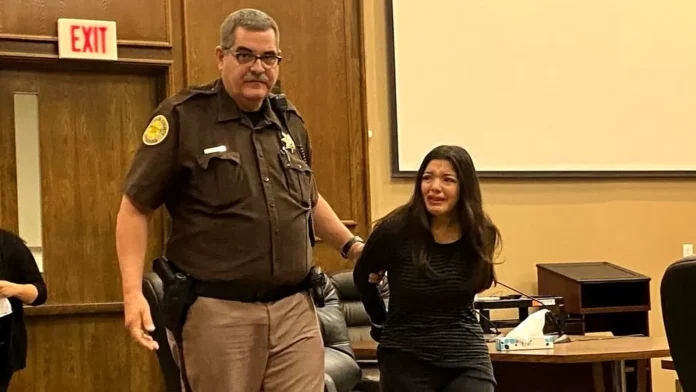Nebraska Teen Faces 90 Days in Jail for Abortion Decision
In a landmark legal case that has sparked widespread debate and attention, a US teenager, Celeste Burgess, was sentenced to 90 days in jail for taking abortion pills to terminate her pregnancy and disposing of the fetus with her mother’s assistance. This gripping and controversial incident has drawn significant interest from abortion advocates and opponents alike, especially in the wake of the Supreme Court’s 2022 ruling that overturned the nationwide right to abortion and granted states the power to determine abortion regulations.
Background of the Case
Celeste Burgess, who is now 19 years old, found herself at the center of a legal storm when she pleaded guilty to illegally concealing human remains after undergoing an abortion at approximately 28 weeks of pregnancy when she was just 17 years old. Her mother, Jessica Burgess, aged 42, is also facing serious charges for aiding her daughter in the procedure and violating Nebraska’s abortion law.
It is essential to understand the context of this case, as it occurred in Nebraska, where abortion laws have undergone significant changes in recent times. Initially, Nebraska allowed abortions up to 20 weeks from conception, but earlier this year, the state lawmakers passed a stringent abortion ban, limiting the procedure to only 12 weeks after conception.
The Investigation and Legal Proceedings
The investigation into the Burgess case began in June 2022, before the Supreme Court’s landmark ruling. During this time, the mother and daughter resided in Nebraska, where the new restrictive abortion law was already in effect. Court documents revealed that Celeste Burgess consumed abortion pills when she was approximately 28 weeks pregnant, rendering the procedure illegal according to Nebraska law.
When confronted by the authorities initially, Celeste Burgess reportedly claimed that she had experienced a stillbirth. However, evidence from court documents painted a different picture. Messages exchanged over Facebook between the mother and daughter indicated that they had discussed obtaining abortion pills and “burning the evidence,” which eventually led to their arrests.
In May, Celeste Burgess pleaded guilty to the felony charge of removing or concealing human skeletal remains. In the process, two other misdemeanor charges were dropped, including concealing the death of another person and false reporting. Her sentence consisted of three months in jail, along with two years of probation.
On the other hand, Jessica Burgess admitted her role in the incident, pleading guilty to providing an illegal abortion, making false statements to authorities, and tampering with human skeletal remains. Her sentencing is scheduled to begin in September, adding further weight to this high-profile case.
National Impact and Abortion Advocacy
This particular case has garnered nationwide attention, with abortion advocates and opponents closely monitoring its developments. The Supreme Court’s decision in 2022 to allow states to determine abortion regulations has resulted in a slew of states enacting restrictive abortion laws, making this case even more critical to the ongoing discourse surrounding reproductive rights.
It is worth noting that late-term abortions are relatively rare. Before the landmark Roe v. Wade ruling, the majority of abortions took place before the 13th week of pregnancy, as reported by the US Centers for Disease Control and Prevention (CDC). However, the Burgess case has reignited discussions on the complexities of abortion laws and individual rights in the United States.
Conclusion
The Celeste Burgess case serves as a poignant reminder of the legal complexities surrounding abortion rights in the United States. With Nebraska adopting a strict abortion ban at just 12 weeks after conception, the landscape of reproductive rights continues to evolve.
As this case continues to be closely watched and debated across the nation, it highlights the significance of addressing such sensitive issues with compassion, empathy, and understanding. The judicial system’s response to this case will undoubtedly shape the future of abortion laws in Nebraska and potentially set a precedent for other states grappling with similar controversies.
The implications of this case extend far beyond the individuals involved, spurring a broader conversation on the delicate balance between reproductive rights and state regulations. The Supreme Court’s 2022 ruling has set the stage for a contentious and complex legal battle across the country.
In conclusion, the Celeste Burgess case epitomizes the ongoing struggle to find common ground in the polarizing debate surrounding abortion rights. It serves as a stark reminder that the right to make personal choices about one’s body remains at the heart of this issue, and the legal system’s response will have far-reaching implications for the future of reproductive rights in the United States.








[…] Nebraska Teen Faces 90 Days in Jail for Abortion Decision […]